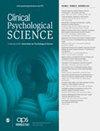重度抑郁症和边缘型人格障碍的日常情绪调节
IF 4.8
2区 医学
Q1 PSYCHIATRY
引用次数: 1
摘要
情绪障碍是大多数精神障碍的固有方面,可能是由情绪调节受损引起的。在本研究中,我们考察了受影响个体在情绪调节方面与健康个体的差异,以及不同精神障碍个体在情绪调节方面是否面临相似或不同的困难。通过对55名重度抑郁症患者、52名边缘型人格障碍(BPD)患者和55名健康个体进行为期7天的经验抽样,我们克服了早期方法上的局限性,实时评估了6种调节策略的使用和有效性。所有的参与者都是女性。与健康个体相比,两个临床组都更多地使用反刍和抑制,而更少地使用接受。抑郁症患者甚至比BPD患者更频繁地反刍。表达抑制和反刍对各组后续情绪均有负向影响。值得注意的是,两个临床组都能够从适应性调节策略中受益,如果他们确实选择了这些策略。本文章由计算机程序翻译,如有差异,请以英文原文为准。
Daily Emotion Regulation in Major Depression and Borderline Personality Disorder
Emotional disturbances are an inherent aspect of most mental disorders and possibly driven by impaired emotion regulation. In the present study, we examined how exactly affected individuals differ from healthy individuals in regulating their emotions and whether individuals suffering from different mental disorders face similar or distinct difficulty in emotion regulation. We overcome earlier methodological constraints by using a 7-day experience sampling assessing the employment and effectiveness of six regulation strategies real time in 55 individuals with current major depressive disorder, 52 individuals with borderline personality disorder (BPD), and 55 healthy individuals. All participants were female. Both clinical groups employed rumination and suppression more often and acceptance less often than healthy individuals. Depressed individuals ruminated even more often than individuals with BPD. Expressive suppression and rumination showed negative effects on subsequent emotions in all groups. Remarkably, both clinical groups were able to benefit from adaptive regulation strategies if they did select them.
求助全文
通过发布文献求助,成功后即可免费获取论文全文。
去求助
来源期刊

Clinical Psychological Science
Psychology-Clinical Psychology
CiteScore
9.70
自引率
2.10%
发文量
35
期刊介绍:
The Association for Psychological Science’s journal, Clinical Psychological Science, emerges from this confluence to provide readers with the best, most innovative research in clinical psychological science, giving researchers of all stripes a home for their work and a place in which to communicate with a broad audience of both clinical and other scientists.
 求助内容:
求助内容: 应助结果提醒方式:
应助结果提醒方式:


